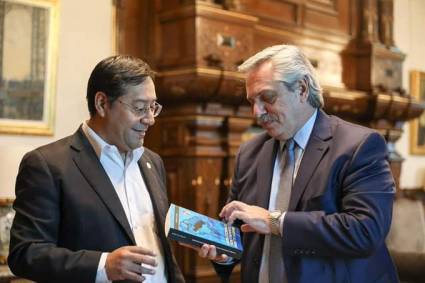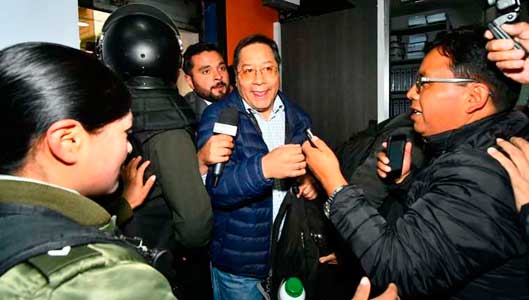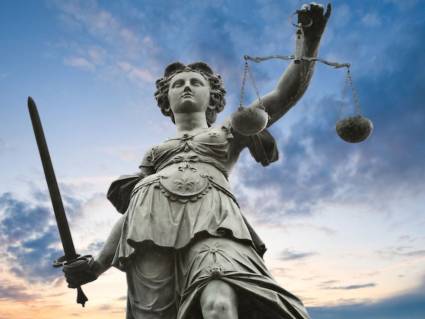Lawfare 4
Disqualification of MAS Candidates?

Disqualification of MAS Candidates Would Aggravate Bolivia’s Political Crisis
The President of the Bolivian Electoral Tribunal (TSE), Salvador Romero, denied on Wednesday that the TSE disqualified the candidacies of former President Evo Morales and former Foreign Minister Diego Pary in the general elections of May 3.
——————————————————————————-
Author: Granma | internet@granma.cu
February 19, 2020 22:02:43
Translated and edited by Walter Lippmann for CubaNews.

According to the electoral calendar, the disqualified candidates must be disclosed on February 23, not before, but a possible disqualification of the mas’s proposals could aggravate the political crisis of the South American country. Photo: TELESUR
The President of the Bolivian Electoral Tribunal (TSE), Salvador Romero, denied on Wednesday that the TSE had disqualified the candidacies of former President Evo Morales and former Foreign Minister Diego Pary in the general elections of May 3.
The local newspaper El Deber published yesterday that the TSE had disqualified both candidates and cited sources from the Movement Towards Socialism (MAS) as the source of the information, reported Prensa Latina.
Romero explained at a press conference that the electoral body has not made any decision on the contested candidacies, and that the information will be made public in accordance with the electoral calendar.
The candidacies of Morales and Pary, aspiring senators from the departments of Cochabamba and Potosi, respectively, are under observation for failing to comply with the requirement of residence in the country for a minimum uninterrupted period of two years.
The TSE’s decision regarding the MAS representatives is expected amidst constant complaints of non-compliance with laws to keep them out of the electoral race.
In previous days, this political organization issued a statement, in which it questioned the decision of the electoral body to submit to a resolution the approval or not of the presence of the candidates observed on the ballots, which it assured was due to political reasons and not due to technical or legal reasons.
MAS Declares Itself in a State of Emergency

MAS Declares Itself in a State of Emergency
The Supreme Electoral Tribunal is still analyzing 13 cases against which there is a demand for disqualification, and among them are the candidates of the Movement to Socialism for the Presidency, Luis Arce Catacora, and the Senate, Evo Morales and Diego Pary
 Published: Tuesday 18 February 2020 | 11:47:06 pm.
Published: Tuesday 18 February 2020 | 11:47:06 pm.
By Juventud Rebelde
digital@juventudrebelde.cu
Translated and edited by Walter Lippmann for CubaNews.

Arce traveled to Argentina for a series of meetings between MAS leaders, and on Tuesday he met with President Alberto Fernández. Autor: MAS Published: 18/02/2020 | 11:32 pm
La Paz, February 18.- Bolivia’s Supreme Electoral Tribunal reported that of 2,107 candidates who presented their candidacy on February 3, 1,278 are qualified to continue in the electoral race towards the May 3 elections, while 797 failed to meet the necessary requirements.
At the same time, the TSE is still analyzing 13 cases against which there is a demand for disqualification, and among them are the candidates of the Movement to Socialism (MAS) for the Presidency, Luis Arce Catacora, and for the Senate, Evo Morales and Diego Pary. This has been denounced on social networks because it is considered “not normal” that they seek to force a possible disqualification and this is even seen as a preview of another fascist coup in Bolivia by brushing aside the popular will.
Arce – the former economy minister of Evo Morales, considered the architect of Bolivia’s economic development over the past 13 years – leads the first poll of voting intentions for the next general elections with 31.6 percent, followed by former president Carlos Mesa with 17.1 percent, and by the self-proclaimed president of Bolivia, Jeanine Áñez, the candidate of Juntos, with 16.5 percent.
MAS candidate’s hearing suspended

Bolivia
MAS candidate’s hearing suspended
due to procedural irregularities
Luis Arce declared that the irregularities of the process are a sign that he is a victim of political persecution with the aim of undermining his race for the presidency of the Republic, a position for which he is considered a favorite.
By Prensa Latina
Translated and edited by Walter Lippmann for CubaNews.

prensa-latina.cu
La Paz, Jan 29 (Prensa Latina) Bolivian presidential candidate for the Movement Towards Socialism (MAS), Luis Arce, explained that a hearing against him set by the coup government was suspended today due to irregularities.
This morning, Arce went to the Public Prosecutor’s Office in this capital to comply with the summons, but the hearing was canceled due to the defense’s claim that the prosecutor’s signature was missing from the summons and that he did not know the details of the process.
For the above-mentioned reasons, recognized by the prosecutor Heydi Gil, the Prosecutor’s Office decided to suspend the hearing and set a new date, still unknown.
Upon his departure from the Justice building, Arce declared that the irregularities of the process are a sign that he is a victim of political persecution. Its the objective is the undermining of his race for the presidency of the Republic, a position for which he is considered a favorite.
I am a transparent man, I came to testify because I have nothing to hide, I am not corrupt, I am not a thief. My team of lawyers and the prosecutor herself noticed the procedural flaws in the notification of my person. This is eminently political against our MAS candidacy, declared Arce.
Former Minister of Economy and Finance during almost all of Evo Morales’ governments, Arce also warned that in order to reduce his chances of winning at the polls, he does not rule out the appearance of new legal cases.
The things that will get us out, is that the people will judge the way they proceed, arbitrarily, against a candidacy that they know has popular support, because we are absolutely innocent of anything they want to tell us, said the MAS candidate.
General elections in Bolivia are scheduled for May 3, and according to recent polls, the MAS duo of Arce and former Foreign Minister David Choquehuanca (for vice president) is the favorite.
Denunciations of political persecution of activists and leaders of this political movement and related organizations have been reiterated since the coup d’état that forced President Evo Morales to resign from office on November 10.
Lawfare on the Bench

Lawfare on the Bench
A non-binding investigation could show the dirty methods that certain judicial systems use to engage in politics… also very dirty
By Marina Menéndez Quintero
January 25, 2020
Translated and edited by Walter Lippmann for CubaNews.

lawfare Author: Taken from the Internet Published: 25/01/2020 | 07:38 pm
Chilling tales of lies, slander and unjust prison sentences could come to the fore, totally naked, if nothing blocks the work of the judges who make up an unusual court: the Ethics Tribunal which has set out to investigate – and ventilate! – the most notorious cases of lawfare.
Perhaps because the court is presided over by an Argentine constitutionalist magistrate – the prestigious and experienced Eduardo Barsesat – or because the news has had wide repercussions in his country, the media has pointed out that the entity is a creation of “sectors close to Kirchnerism” .
However, Barsesat explained that the idea had been around for two years and, in fact, it was conceived in Madrid, not in Buenos Aires. It was in the Spanish capital that the foundation of the court was first announced last November, and the city in which its ruling will also be announced exactly one year later, next November.
According to the magistrate’s statement to the alternative media El Destape Radio, this is “a joint initiative of the Lawfare Institute of Sao Paulo, which includes Lula’s defense lawyers, and the Common Action Forum of African countries.
The lawyer – who has participated as a prosecutor and judge, respectively, in two other ethical judicial processes (the one that was developed to establish the responsibilities of the Argentine military dictatorship and the one that analyzed crimes for economic, social and cultural crimes) – is concerned that lawfare “is not foreseen in any international doctrine” and constitutes, he says, “a perverse practice that generates the civil death” of those who are its victims.
“Many believe that the processes that disqualified Lula from being a presidential candidate or that they used here to persecute Cristina (Fernández) or to outlaw (Rafael) Correa, are normal processes; and we want to demonstrate that they are irregular,” he explained to other media.
“It’s a judicial persecution in which nobody is very sure of what their rights are,” he said in one of the many interviews he has given in recent days, while denouncing the digital publication Perfil: “Lawfare, or judicial warfare, which would be its meaning in Spanish, is a practice of persecution and destruction of political opponents or enemies, using judicial processes as a weapon.
In accordance with the announcement, the Ethics Tribunal that has just been set up will issue summonses and collect testimonies and documents, interview detainees and then issue an ethical judgement.
Barsesat is not too concerned that such a ruling will not lead to effective penalties.
In an article close to a declaration of principles about the functioning of the court and signed by the jurist himself in El Destape, Barsesat recognizes that, in the face of what he calls “a new modality of the former doctrine of “national security” – and which operates, fundamentally, by implementing the rotten leg of the administration of justice – it is difficult to expect a trial of lawfare before the same judges who are its executors and ideological supporters.
“Nor are there any jurisdictional bodies, regional or international, that can operate with training and authority to disrupt the lawfare,” he adds.
However, it also takes into account that there is a need to “make people aware of the irregularity and anti-juridicality of this phenomenon, while advancing in “the task of making people aware of this new instrument of social domination, and opening up paths for future challenges before judicial bodies, national, regional and international.
These political crimes will not be the only ones to be tried, as they could be considered.
What Barsesat calls “a new undertaking of that juridical consciousness of humanity that comes from a resolution of the CAF (the Common Action Forum), to constitute the Common Action Tribunal (the name of this very special court)”. It also intends to prosecute the practice that he identifies as whistleblowing: “the persecution as informants, of those who make public data described as secret by the hegemonic powers,” he explains.
And one wonders if it would be possible, then, to also analyze the persecution that keeps the Australian journalist Julian Assange virtually under kidnapping. Unfortunately, many in the world seem to have forgotten the effectiveness of the leaks that published, in black and white, the hairs and signs of the warlike execution of W. Bush. This was thanks to the audacity of his web site Wikileaks. The same could be said of then Sergeant Bradley Manning (Chelsea Manning).
Big Game Hunting
There is reason to wonder whether the penetrated judicial systems that have put this practice into effect will allow the court headed by Barsesat and composed of also experienced jurists from other nations to proceed, when they require files, or the “evidence” that in many cases does not exist?
But the truth is that his appearance could not be more fair and timely.
A look at recent events in Latin America – just to look at this part of the world – and even a glance at the events that are taking place right now, allows us to see how recurrent the use of “the judicial war”, or “the judicialization of politics”, as it is more commonly known, is to stone not only progressive or frankly leftist political leaders. It is also being used to demonize movements and parties, to twist the destinies of some countries and, of course, to criminalize political processes.
The case of Luiz Inácio Lula da Silva, who was confined in an improvised prison at the police headquarters in Curitiba for a year and a half after a trial that was rushed to a close when the resources of the defense had not yet been exhausted, and against whom some six legal cases are still open on unproven charges, so that his freedom is still not definitive, is the most notorious.
He was succeeded by his fellow worker and co-religionist of the Workers’ Party, Dilma Rousseff, the first piece of work to be broken in Brazil by means of treason, distortion and lies, in an impeachment that anticipated the political play in gestation.
Also victims of lawfare are former Ecuadorian Vice President Jorge Glas, locked up and then transferred to an inhospitable maximum security prison for acts that were not sufficiently proven and considered corrupt. Also, former President Rafael Correa himself, prevented from returning to Ecuador by the arrest warrants circulated to Interpol against him,. These are also on the basis of unproven accusations that have ranged from an alleged attempt to kidnap a congressman to the presumption that he was organizing a coup d’état. It’s a fantasy!
But the judicial persecution has also been hung on less prominent figures such as former ministers or ex-officials of the Argentine governments of “the Kirchners”. It is still hanging over Vice President Cristina Fernandez, accused of several alleged acts of corruption, and the first voice to denounce lawfare as a way of judicializing politics.
In any case, if anyone doubts the artful and opportunistic way in which this is being employed, they need only look at Bolivia. Evo Morales, who left the country after being threatened by the military to prevent the coup d’état from ending in a massive bloodbath, has now been accused by the coup leaders of “terrorism” and “sedition”.
And less than 24 hours after his name was included on the Movement Toward Socialism (MAS) ballot for the announced presidential elections in May, former minister Luis Arce has just been included among those accused of alleged embezzlement from the Indigenous Fund. Here is another way to prevent the MAS from regaining the presidency!
However, such examples are not the only ones that are outrageous. Glenn Greenwald, the U.S. journalist who runs the website The Intercept in Brazil. He published, along with two other colleagues, the audios that prove how the trial against Lula, in the midst of Operation Lava Jato, was “fabricated”. They followed the instructions of the prosecutor-turned-Justice Minister Sergio Moro, another one being pursued by “justice”, which accuses him of committing computer piracy and cyber-crimes.
Dr. Bersesat is right when he explains that lawfare is based, among other things, on fictional stories. What is not fiction at all is its extermination character, as could only happen to the minds that are credited with its creation in 2001 as part of the U.S. military’s doctrines of domination and unconventional methods.
TRANSLATOR’S NOTE:
Lawfare is a form of war consisting of the use of the legal system against an enemy, such as by damaging or delegitimizing them, tying up their time or winning a public relations victory.[1][2] The term is a portmanteau of the words law and warfare.
https://en.wikipedia.org/wiki/Lawfare
Subscribe to Blog via Email
| M | T | W | T | F | S | S |
|---|---|---|---|---|---|---|
| 1 | 2 | 3 | 4 | 5 | 6 | 7 |
| 8 | 9 | 10 | 11 | 12 | 13 | 14 |
| 15 | 16 | 17 | 18 | 19 | 20 | 21 |
| 22 | 23 | 24 | 25 | 26 | 27 | 28 |
| 29 | 30 | |||||

You must be logged in to post a comment.